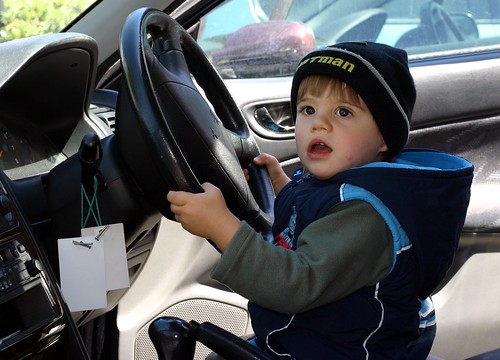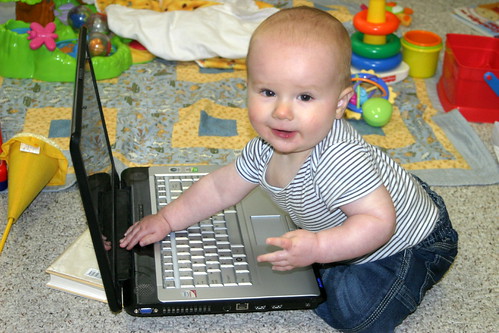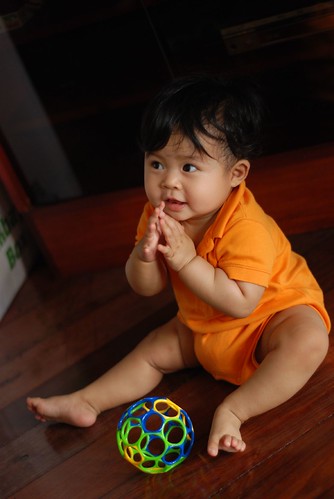Have you ever had an idea come to you out of the blue; an idea so obvious and simple, that you can’t believe no one has thought of it before? An idea you can’t wait to share with anyone who will listen, because you just know it will change the world for the better, and if not that, at least it can’t do much harm? Well I had one of those flashes today, and I am just itching to share, so here goes: I think this just may be the next “big thing” in parenting and educating babies and toddlers, the piece that has been missing and without which our babies and toddlers aren’t faring nearly as well as they might. Are you ready to hear what this missing piece is? It is simply this: We should be encouraging and teaching our babies to drive as soon as they are sitting up on their own. Just think about it for a minute before you dismiss my idea out of hand. Here are five good reasons to begin drivers education before your child is even out of diapers.

1) First of all, driving is a complex skill that most people will need to learn in order to survive and thrive in our industrialized, highly mobile society. So it makes sense to introduce your child to the basics early. You want her to grow familiar and comfortable with this tool she will be using for the rest of her life. The earlier you introduce her, the better. Of course, you aren’t going to just hand the keys over and leave her to her own devices; you’ve got to take it slow in the beginning. At first, you must always be present to supervise, guide, and interact. You can begin by just allowing your baby to sit in the driver’s seat, and let him practice playing with all of the various knobs and buttons so he can see what they can do. (I am, of course, writing a book, available soon on the e-reader of your choice, suitable for use by parents and educators. It will be full of suggested guidelines, lesson plans, extended learning opportunities, books and games, and so much more, all intended to help you make the most of this overlooked but wonderful learning tool that you no doubt have sitting in your driveway at this very moment.)
2) Which brings me to my second point: Cars are the ideal, interactive teaching and entertainment tools for young toddlers. Have you ever known a baby who doesn’t love to sit behind the wheel of a car, honk the horn, fiddle with the radio controls, turn the wipers on and off, shift the gears, and so on? Toddlers learn through hands on interaction with objects in their environment, and they are thrilled when their actions cause things to happen. What better way to provide hours of interactive learning (disguised as play) for your little one? Also, to date, your baby has been a passive on-looker, as she’s been strapped in a car seat in the back, and has had nothing to do but bide her time, and stare out at the scenery during long car rides. By moving her to the front seat, and letting her get her hands on all of these wonderfully responsive knobs and buttons, you are moving her into the realm of an active participant in her own learning.
3) Think about this too: As your child grows, and her interests and skills grow, so does the number and variety of activities she can do, using the car. She can learn to put the keys in the ignition, and turn over the engine, and as soon as she can reach the gas pedals and brake, she can actually take the car out for a spin. Steering, navigating, map skills, plotting a course, reading road signs, following the rules of the road, oh gosh- the possibilities for expanded learning are just endless. She may even become interested in car care, and maintenance and learn to understand the workings of an engine. Some children will even be designing their own prototypes by the time they’re in elementary school.
4) Again, with so many learning opportunities, doesn’t it just make sense to introduce the car early? It seems to me the earlier we start teaching our babies how to operate and care for a car, the better chance they will have at becoming proficient drivers at a much earlier age. And just think about how this might benefit you as a parent. No more endless hours spent in the car, ferrying children back and forth to school, to doctor appointments, lessons, playdates – what have you. By the time they’re about ten years old, children should be able to manage mostly on their own, and even arrange their own carpools. You can finally take a well deserved break, and they can feel the satisfaction of being able to get themselves to and from where they want to go- it will literally open up new worlds for them, at a much younger age than previously.
5) Finally, it’s time that we as a society stop underestimating our children, and what they are capable of. If we treat them like babies, incapable of understanding and mastering complex tasks, they will continue to act like babies. Times change, and the way we teach our children has to change with the times. Children will still have plenty of time to run around outside, and generally act like children, as long as we remember that we are the ones in control of the keys, and we limit the time we allow them to spend in the car playing and practicing their driving skills. But, if we are going to show our toddlers that we have any respect for them, that we believe in them and their capabilities, we’ve got to start giving them access to opportunities and tools that will stretch their horizons, at an early age. We don’t want them falling behind, do we? Besides, who needs toys when you can just hand your baby the keys to the car and make him happy for hours?
Now, I can imagine that there may be a few of you out there who are still unconvinced. Innovative ideas are always met with some skepticism and resistance at first, but I’m sure that this one is a winner. I’d love to have the opportunity to be the first to hear and reply to your concerns and questions. I have no doubt I can help to allay any fears or misgivings you may have, so please, comment freely and honestly.

(Now that I’ve convinced you all that I’ve gone completely nuts, go back and re-read this post, inserting the word “computer” wherever I’ve written car or driving. I wrote this post tongue firmly in cheek, after reading a tweet by Lisa Belkin, “Remember when toddlers used to be transfixed by your car keys? Ipad apps for Toddlers????” I thought, “Toddlers are better off with the car keys…” Most parents and early childhood educators would never think of handing a toddler the car keys, leading him to the car and saying “OK, here you go, have at it”, yet we might not think twice about handing a baby an iPhone or an iPad, for entertainment or learning purposes. There are marketers (no surprise), and there are even some early childhood professionals who advocate for the use of screen technology with our youngest children, but I can’t get behind this agenda. For a thoughtful exploration and discussion of the topic, you might want to look at this post at Childhood 101 , Why I don’t want to share my lap top (with my children. Additionally, this post , entitled the Mind/Body Problem, written by Susan Lin, of Commercial Free Childhood makes a compelling argument for why we should all be advocating for limits on screen time for young children. Susan’s post was written in response to NAEYC’s (National Association For The Education of Young Children) proposed technology position statement, which is being updated this year, and is meant to guide early childhood educators in the use of technology in early childhood classrooms. Technology is here to stay. Computers are wonderful tools- for adults. Children can and will learn to use computers, just as they learn to drive cars, and they won’t be missing out on anything by waiting until they are developmentally ready. I don’t believe they are ready until they are well out of their toddler years. In my opinion, children younger than say, the age of eight, have more to lose by engaging with screens, than they stand to gain. What are your thoughts?)

